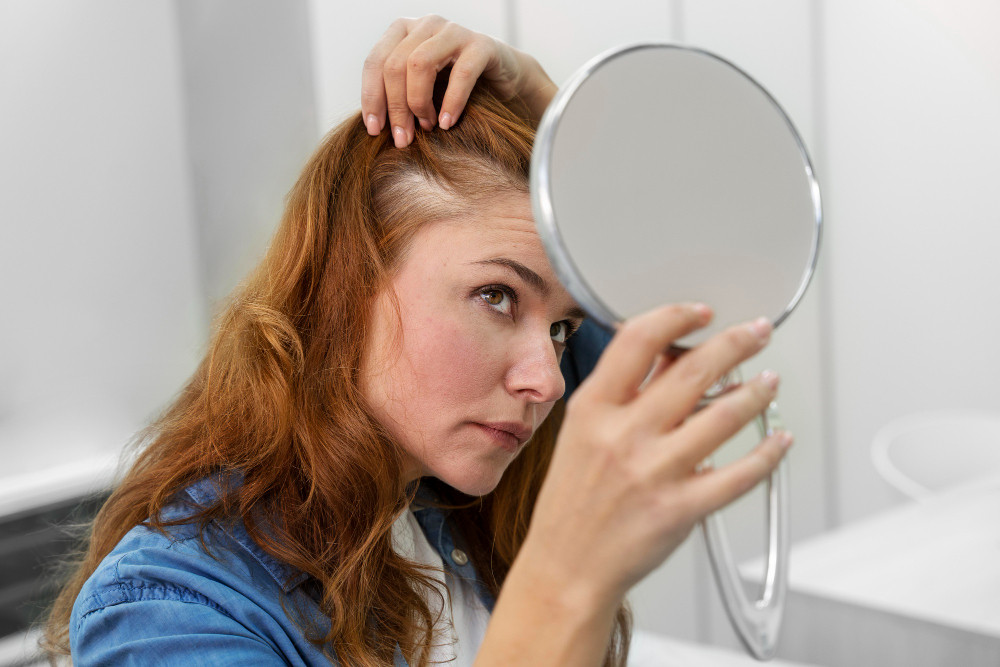Ketika mengalami menopause, tubuh wanita banyak mengalami perubahan. Selain berhenti menstruasi, wanita juga dapat mengalami perubahan suasana hati, nyeri sendi, masalah rongga mulut, hingga kerontokan rambut. Bagaimana menopause menyebabkan kerontokan rambut dan adakah cara mencegahnya? Simak ulasan berikut.
Menopause dan Kerontokan Rambut
Menopause merupakan proses alami yang dialami semua wanita ketika bertambah tua. Saat usia bertambah, indung telur akan makin sedikit menghasilkan hormon kewanitaan sehingga pada saatnya indung telur tidak melepaskan sel telur lagi. Kondisi inilah yang menyebabkan wanita tidak mengalami menstruasi yang disebut menopause.
Berhentinya produksi hormon menyebabkan perubahan fisik dan mental pada wanita di antaranya hot flasshes, perubahan suasana hati, insomnia dan rambut rontok. Pada wanita, penipisan rambut terjadi secara keseluruhan area kepala. Kerontokan rambut juga bisa terjadi saat menyisir rambut atau keramas.
Rambut rontok saat menopause disebabkan oleh ketidakseimbangan hormon. Hormon-hormon ini membantu rambut tumbuh lebih cepat dan bertahan di kepala untuk jangka waktu yang lama. Penurunan hormon estrogen dan progestron ini menyebabkan rambut mengalami kerontokan saat menopause.
Baca Juga: Cara Positif Menghadapi Gejala Menopause
Penanganan Rambut Rontok akibat Menopause
Rambut rontok di usia menopause atau sekitar 45-55 tahun dapat menyebabkan wanita merasa tidak percaya diri. Beberapa cara yang bisa Anda lakukan untuk mengatasi rambut rontok saat usia menopause antara lain:
- Jangan terlalu sering mencuci rambut. Keramas terlalu sering menyebabkan rambut kering dan rapuh. Sebaiknya keramas setidaknya 2 kali seminggu.
- Pilih produk yang tepat. Pilih produk perawatan rambut seperti sampo, kondisioner, atau lakukan perawatan rambut seperti masker rambut yang memiliki formula khusus rambut rontok.
- Makan makanan kaya nutrisi untuk rambut. Pilih makanan yang mengandung nutrisi untuk rambut seperti daging merah, sayuran hijau, telur, beri dan alpukat yang mendukung rambut sehat sehingga tidak mudah rontok.
- Konsumsi multivitamin. Dokter dapat merekomendasikan konsumsi multivitamin seperti vitamin D3 atau biotin untuk membantu mencegah kerontokan rambut.
- Menggunakan minoxidil. Jika kerontokan rambut Anda parah, dokter dapat merekomendasikan penggunaan minoxidil yang merangsang folikel rambut untuk menumbuhkan rambut yang tebal dan sehat.
- Periksa obat-obatan yang dikonsumsi. Saat usia menopause, Anda mungkin memerlukan obat-obatan lain untuk mengatasi masalah kesehatan kronis Anda. Beberapa obat-obatan bisa memiliki efek samping yang menyebabkan kerontokan rambut. Jika rambut rontok karena obat-obatan yang Anda konsumsi, Anda bisa berkonsultasi ke dokter untuk alternatif obat atau pengobatan rambut rontok.
Baca Juga: Tips Menjaga Kesehatan Jantung setelah Menopause
Bisakah Kerontokan Rambut saat Menopause Dicegah?
Kerontokan rambut disebabkan oleh banyak faktor seperti stres, nutrisi, kondisi medis dan kekurangan nutrisi tertentu. Untuk mencegah kerontokan rambut terutama di saat menopause, beberapa cara yang bisa Anda coba antara lain:
Mengelola stres
Mengelola stres dengan bijak penting untuk mencegah efek samping dari ketidakseimbangan hormon seperti rambut rontok. Anda bisa mengelola stres dengan melakukan yoga, latihan pernapasan dan journaling.
Makan makanan sehat
Mengonsumsi makanan sehat dapat membantu mencegah kerontokan rambut. Konsumsi makanan nutrisi seimbang dengan mengonsumsi biji-bijian, buah-buahan, sayuran, protein, dan makanan yang kaya akan asam folat seperti ikan salmon, tuna, kacang almon, dan kacang kenari.
Aktif berolahraga
Rutin berolahraga dapat membantu menjaga keseimbangan hormonal yang dapat mendorong pertumbuhan rambut sehat. Selain itu, olahraga juga dapat memberi rasa bahagia yang mampu mengatasi perubahan suasana hati saat menopause.
Rambut rontok saat menopause merupakan hal yang banyak dialami wanita. Dengan penanganan yang tepat, kondisi rambut rontok saat menopause dapat dicegah atau diatasi. Jika memiliki pertanyaan seputar kesehatan rambut, Anda bisa memeriksakan diri ke dokter atau manfaatkan fitur konsultasi yang tersedia pada aplikasi Ai Care.
Mau tahu informasi seputar penyakit lainnya? Cek di sini, ya!
- dr Nadia Opmalina
Upham, B. (2023). Midlife Hair Loss: What Causes It and Expert Tips on How to Deal. Available from: https://www.everydayhealth.com/womens-health/midlife-hair-loss-what-causes-it-and-expert-tips-on-how-to-deal/
Cappeloni, L. (2023). Menopause Hair Loss Prevention. Available from: https://www.healthline.com/health/menopause/hair-loss
Upham, B. (2021). Help for Thinning Hair. Available from: https://www.everydayhealth.com/menopause/help-for-hair-thinning-in-midlife/#
Hart, Y. (2022). Hair loss in women after 50 - Best treatments. Available from: https://www.mdhair.co/article/hair-loss-in-women-after-50-best-treatments








